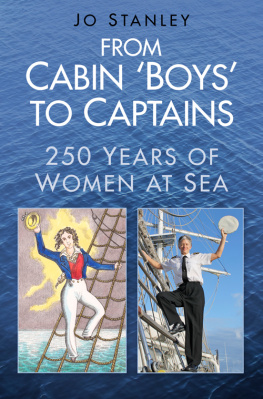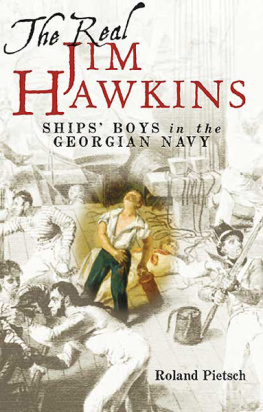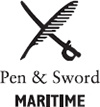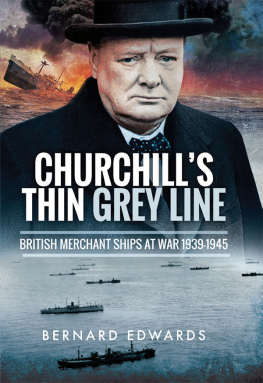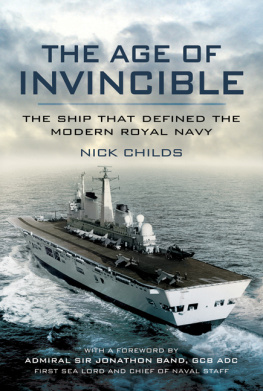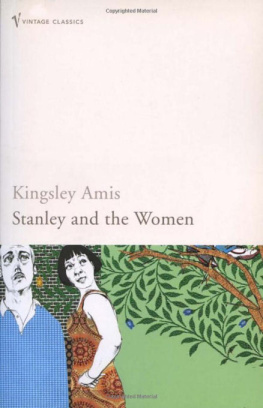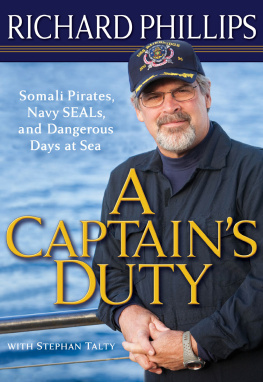

This book is dedicated, with respect, to all women seafarers, and in particular to Akhona Geveza, Victoria Drummond, Edith Sowerbutts, my great aunt May Quinn and Lucy Wallace.
M any women seafarers shared their stories, at length and with generosity, and enabled me to better understand their successors. There is no bank of stories ready made and accessible for any internet browser, no archive full of paper life stories, no countrywide network of offices full of hordes of video tapes awaiting the researcher of seafarers lives. The real live seafarers themselves have to speak. They did, generously, and thereby provided the bricks for this book. As the mortar-supplier and the architect Id be unable to act without them. Thank you. They include Judie Abbott, Ellie Ablett, Mary Anne Adams, Julia Ashton, Kathy Atkinson, Nina Baker, Jackie Banyard, Leslie Barnes, Hilary Beedham, Sally Bell, Joy Bennington, Denise Bonner, Freddy Bosworth, Una Brown, Arleen Cameron, Barbara Campbell, Carol Cole, Lesley Cox, Sara Coxon, Jill Coulthard, Sarah Craig, Sara Coxon, Carole Critchley, Clare Cupples, Sue Diamond, Rachel Dunn, Caroline Eglin, Becky Elliott, Marjorie Ellison, Linda Forbes, Nancy Foxley, Sadie Grist, Susan Godding, Anita Hellewell, Robina Herrington, Muriel Hocking, Gloria Hudson, Lisa Jenkins, Fazilette Khan, Rose King, Inge Klein Thorhauge, Val Lawson, Lynn Littler, Christine McLean, Victoria McMaster, Margaret Mace, Ann Madsen, Tina Maude, Frances Milroy, Sabine Machado-Rettau, Maud McKibbin, Louise Merrill, Frances Milroy, Tina Mobius, Susie Newborn, Margaret Newcombe, Jane Nilsen, Caroline Norman, Belle Norris, Irene Organ, Alice Pickles, Caroline Pritchard, Margaret Rennison, Pat Rickard, Joan Roberts, Maureen Ryan, Fiona Rush, Denise St Aubyn Hubbard, Lesley Schoonderbeek, Rosemary Selman, Madeline Shurrocks, Linda Simkins, Sue Spence, Freda Taylor, Sally Theakston, Sue Thomson, Sally Townsend, Carol Peacock, Jessica Tyson, Ros Vallings, Debbie Wilson, Katy Womersley and her colleagues at Clyde Marine, Jane Yelland, Jean Washington, Barbara Wells, Sue Wood, Eve Wright and Sha Wylie (quotation marks indicate a pseudonym).The brevity of their stories in these pages in no way reflects the extent of their helpfulness; they infuse the book in all sorts of subtle and huge ways.
I also thank the seawomen Ive been interviewing since the mid-1980s. Many enriched this book. Those directly quoted include Margaret Arthur, Merry Black, Dianne Drummond, Edwina Parcell, Norah Rivers and Marie Smith.
Some of the modern seawomen who helped me with this specific book are now reluctant to be named, or even anonymously quoted. I appreciate them very much, including for what their reticence taught me.
Some seawomen have left written or spoken records that have been invaluable. I hope others will be inspired to follow suit, and put their accounts in archives. My thanks go to writers and story-givers such as Edith Sowerbutts, Joan Phelps and Ida Digweed for their efforts and for allowing public access to their stories. Relatedly, I thank the interviewers (especially those at Southamptons former Oral Heritage Unit) for their good interviewing, and the Southampton City Archive for making the records available.
Many family historians have posted stories about women relatives on websites. These have enriched maritime historiography. So too have the websites where seafarers chat to each other relatively unguardedly about sea life (Im sorry, but yes, I am listening). Thank you for posting.
I offer immeasurable thanks to all those women and men who linked me up with seawomen they knew, or who gave me background information. They include Colin Atkinson, Colleen Arulappu, Dave Baker, Colin Banyard, Mark Barton, John Butt, Tim Carter, Don Cockrill, Peter Collinge, Zak Coombs, Vera Corner Halligan, John Crosbie, Peter Cutmore, Godfrey Dykes, Pam Farmer, John Goddard, Henrietta Heald, Graham Hellewell, Martyn Hird, Bob Hone, Derek Ings, Terry Kavanagh, Alston Kennerley, Jan Larcombe, Natalie Lashley, Peter Lay, Stuart Le Fevre, Louise Miller, Tony Morris, John Mottram, Brian and Lisa Murray, Maurice Onslow, Bob Redmond, Denise and Martin Reed, Michael Robarts, Martin Robson, Albert Schoonderbeek, Tony Selman, Colman J. Shaughnessy, Sitling Tull, Debbie Snaishall, Bernard and Sally Stonehouse, David Sweet, Gary Hindmarch and Danielle Ronaldson at South Tyneside College, Southamptons Retired Stewardesses group, Fred M. Walker, Derek Warmington, Brian White, Martin Wilcox, D.G.A. Williams, Willie Williamson, Tony Winder, Robert Wine, Kevin Winter, Mark and Keith Winterbottom, Stuart Wood. Of course, any mistakes are my responsibility, not theirs.
Relatives and friends of deceased seawomen have been invaluable in sharing pictures, documents and stories. Those whove kindly done a lot of searching in attics and grappling with scanners include Ros Balfour, Jan Buttifont, Jeremy Chandler-Browne and Susan Browne, Sue Freeman, Mrs Hobbes, Ian Hugh McAllister, Bob Proudlock, Edith and David Ross, Peter Smith-Keary, Cathy Spratlin, Frank and Heather Taylor, Lindsay and Bruce Urquhart and Susan Young.
Some hub people invited me to reunions or connected me to their retired seafarers newsletters and websites. They include Sue B. (who was almost my agent), John Butt, Pam Farmer, Robina Herrington, Janice Jefferies, Jill Jones, Peter Mayner, Brian Smith, John Squires, Graham Wallace, and several anonymous hosts.
Other writers on relevant subjects shared knowledge with astounding generosity. They include Ros Barker, David Davies, Joan Druett, Henrietta Heald, Terry Kavanagh, Sari Menp, Rebecca Mancuso and Louise Miller. M.A. Fish kindly shared invaluable statistical work on the Womens Royal Naval Service (WRNS).
I would like to thank my family, who were Liverpool seafarers in both the Merchant and Royal Navies. Their legacy, partly interpreted by Vera Stanleys lively curiosity about seafarings subjective meanings, was a cornerstone in envisaging this book.
For decades and all over the world my network of generous maritime historians made this encyclopedic foray possible. I especially thank Skip Fisher, Marcus Rediker and Greg Dening. Ive been supported by being part of several intellectual communities. In the UK they include the institutions where I am Honorary Research Fellow: Lancaster Universitys Centre for Mobilities Research and Hull Universitys Maritime Historical Studies Centre. Belonging to the Womens History Network and the oral history community has been crucial. I especially thank Joanna Bornat, Mary Chamberlain, Anna Davin and Sheila Jemima for helping shape my thoughts and for discussing methodological issues.
Professional archivists, librarians, press officers and statisticians who have helped me include Celia Saywell at the Association of Wrens, Ben Davis at the British Medical Association, Alice Marshall at the Department for Transport (DfT), Maureen Whatry and Sian Wilks at Liverpool Universitys Special Collections Library; Mark Jackson at the Marine Society, Lloyds Register public relations staff including Anne Cowne; Lloyds List staff, including Nicola Good; Robert Merrylees at the Chamber of Shipping; Merseyside Maritime Archives and Records; Mike Demetriou, Kate Patfield and Richard Lavender at the Ministry of Defence (media offices); the Modern Record Centre at the University of Warwick, especially Carole Jones; Jane Owens and Vanessa OSullivan at the Maritime and Coastguard Agency; Glenys Jackson at the Merchant Navy Training Board; The National Archive; staff at the National Museum of the Royal Navy especially Victoria Ingles; Caird Library staff at the National Maritime Museum; headquarters staff at Rail, Maritime and Transport Workers Union, including Jessica Webb and Dan Crimes; Jo Smith at Southampton City Archive; Morag Bremner and Margaret Urquhart at Tain and District Museum; and Lesley Hall and colleagues at the Wellcome Institute. Special thanks go to Nautilus International staff, including Andrew Linington, Sarah Robinson, Debbie Cavaldoro, June Cattini, the Womens Forum team headed by Maryanne Adams, Lisa Carr, the equalities officer, as well as Carole Jamieson and Steve. Theyve been supportive, efficient and hospitable.
Next page
